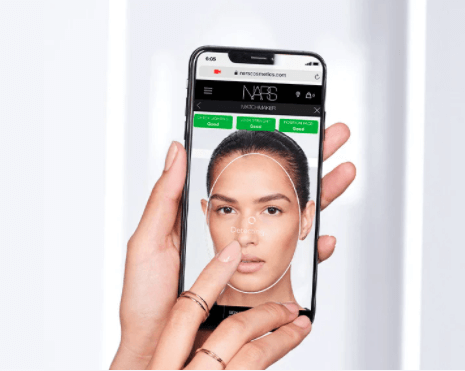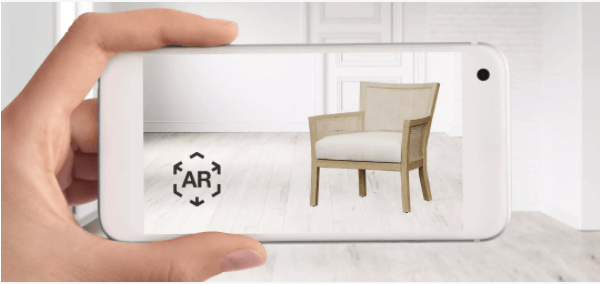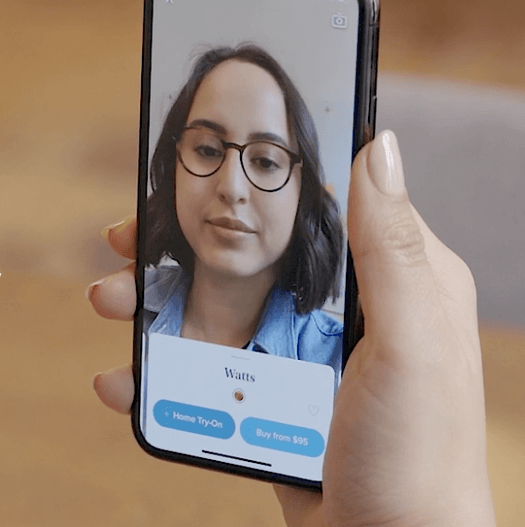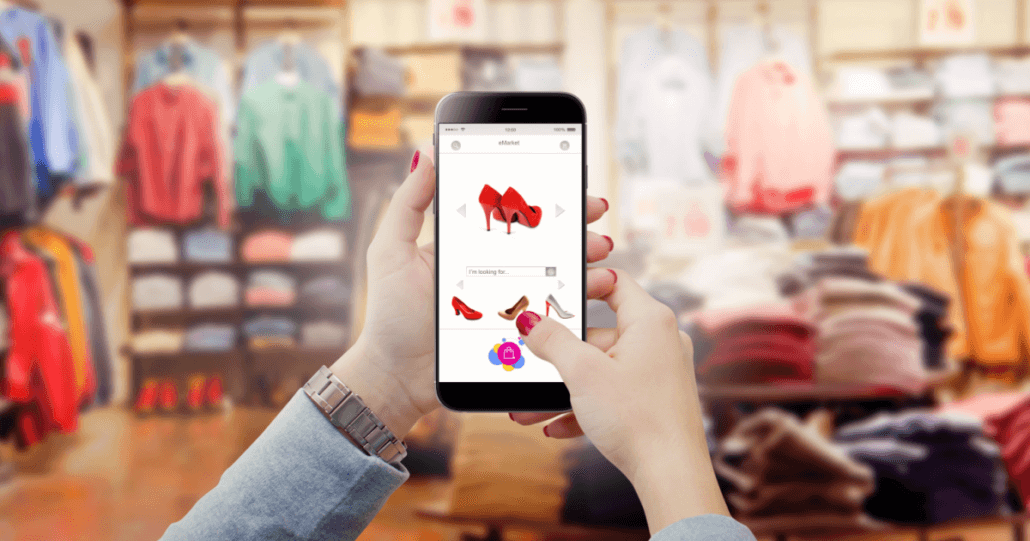February 19, 2024
Ever since The Terminator was released back in 1984, there’s been slight apprehension surrounding artificial intelligence (AI). But it’s been a part of our lives for years, whether we’ve realized or not. AI is becoming increasingly common in the world of e-commerce. And you know what, John Connor hasn’t come back to warn us against it.
Since 1914, AI has helped power commercial airplanes’ autopilot functionality. Today, spam filters, mobile check deposits, and facial-recognition technology all use AI to make consumers’ lives easier.
And in e-commerce, AI is used to improve website search functionality and make better recommendations based on recent browsing activity. The technology also helps power retargeting ads and chatbots.
Now, leading brands and retailers are tapping this technology to improve the shopping experience for customers in innovative new ways. Thanks to the growth of AI in e-commerce, shopping from home, in the park, or literally anywhere you have an internet connection, just got a whole lot more exciting.
Chapters:
- Awesome ways AI is impacting e-commerce
- AI in e-commerce examples
- How to optimize your AI in e-commerce strategy
Awesome ways AI is impacting e-commerce
We’ve been watching the AI trend closely over the past year. Here are some of the most exciting AI in e-commerce use cases to date.
Though it would be fun to list all of the capabilities, approaches, and uses AI provides for e-commerce businesses, we’d be here for a while. Rather than forcing you to take a few personal days to get through it all, we thought we’d narrow it down to our favorite ways AI is changing the world of e-commerce.
1. Endless personalization
Oh, personalization. The hot topic that’ss taken consumer demands to another metaverse while forcing retailers to ask themselves, “Do I really know my customers as well as they want me to?”
Personalized shopper journeys are more of an expectation than an add-on these days. Luckily, AI algorithms can analyze colossal amounts of data, providing valuable insights into things like customer behavior, preferences, and trends. This information helps e-commerce businesses make data-driven decisions, optimize marketing strategies, and customize their offerings to each shopper’s needs.
The result? A bucket load of customer satisfaction, increased engagement, and higher revenue. Personalization has also been proven to strengthen brand loyalty — 70% of consumers say that how well a company understands their individual needs impacts their loyalty. Give them what they want (personalized, relevant experiences), and watch their support grow.
Personalized product recommendations
You can’t talk about e-commerce personalization without mentioning its compatriot, AI-generated product recommendations. These subtle suggestions can create quite the shopper stir when delivered at the right time and in the right way.
First, AI algorithms analyze customer data, like browsing behavior and purchase history to identify shopping patterns. Then, that information is used to recommend products that might interest the shopper. And boom: more sales.
Intuitive cross-selling + upselling
Remember that important customer data we previously mentioned? AI systems can use it to identify relevant cross-selling and upselling opportunities. Even better, AI has a large capacity to learn and adapt, which means that over time you’ll be able to maximize your supplementary sales, propelling and improving your customer lifetime value.
2. It enhances the customer experience
One of the most meaningful ways AI is evolving e-commerce is by providing marvelously-engaging customer shopping experiences. From the very first search to the final post-purchase adieu, AI enables your digital store to function in a way that makes each shopper feel like it was created just for them.
Smarter site search
While it might seem somewhat unassuming, an e-commerce site’s ‘search’ can tell a huge story. And when powered by machine learning technology, its narrative includes advanced algorithms that are enhancing product discovery for online shoppers. 🤖
AI uses advanced natural language processing (NLP), making a user’s shopping experience faster, easier, and more intuitive. By understanding consumer language and combining keyword search and vector search into a single query, results are more accurate, and relevant. This means shoppers have a higher chance of finding exactly what they’re looking for, through two key ways:
- Voice search. This well-known speech recognition technology allows shoppers to search phrases quickly without using a mobile device’s keyboard. Thanks to emerging AI, voice commerce has seen some impressive upgrades. For starters, speech analysis and contextual reasoning have led to more accurate voice recognition. It also saves customers time by reducing the effort (and chance for errors) of manual typing — handy for lengthy product names like, “Organic Queen Size Memory Foam Lavender Scented Pillow”
- Visual search. Sometimes, a shopper wants to find a product but doesn’t know its name, type, or the category it falls under. Usually, it’s right about here that their search journey ends. But with visual search, potential customers can look for products using images and nothing else. If an online visitor doesn’t know the details of an item they’re interested in, all they need to do is use a picture to find what they’re searching for. Not only does this increase product exposure, but it elevates the customer experience by alleviating the friction between curiosity and acquisition
Interactive augmented and virtual reality
Both augmented reality (AR) and virtual reality (VR) enhance the e-commerce experience by providing immersive and responsive features that minimize the gap between online and physical (phygital) shopping.
Maybe it’s because AR integrates simulated elements with the real world, enabling shoppers to engage with products in their own surroundings. Or maybe it’s because AR can seamlessly work with existing devices, so shoppers can experience a product from their iPhone or tablet. Either way, the global AR market is expected to reach $300 billion this year.
Shoppers can try on virtual products, see how items will look and fit in their space, and participate in interactive demonstrations. Another cool AI-driven feature: online retailers can incorporate tailored recommendations and offers for an additional layer of personalization.
Chatbots and virtual assistants
One of the most significant ways AI is transforming e-commerce is through improved customer service. Most e-commerce businesses don’t have time to compose a personalized response to every incoming inquiry. This is where artificial intelligence can really serve a purpose.
Chatbots enable online retailers to provide 24/7 support to their customers. And because they never take breaks or get heated, chatbots can provide a level of service humans can’t match up to. Did we mention they don’t get paid either?
Chatbots use NLP to understand customer queries. This allows them to provide immediate and accurate responses, help shoppers make smart purchasing decisions, and assist with order tracking and returns. These virtual assistants have already been a lifesaver for many digital stores and consumers.
Streamlined checkout process
Did you know that the average cart abandonment rate is around 70%? The good news is that AI can help to decrease the number of lost customers during the checkout process.
AI algorithms optimize the checkout flow by assessing customer behavior and preferences to determine if any recommendations or messaging is needed for that final purchasing persuasion.
Machine learning can also save shoppers time by inputting customer information, and offering advanced support by providing effortless payment processing. Together, this creates a more streamlined shopping experience that can minimize cart abandonment and maximize conversion rates.
3. It improves business operations
There’s a lot that goes on beyond what a shopper sees on their device’s screen. AI makes managing the back-end of e-commerce easier by providing tools that boost efficiency, save on costs, and help online retailers know exactly who to market to.
Increasing productivity
The use of AI in e-commerce empowers businesses to automate several procedures that are usually performed manually. By utilizing this innovative technology, online retailers can diminish their time spent on repetitive and arduous tasks, such as packaging items, restocking shelves, and troubleshooting issues.
The best part? The more AI software is introduced, the more its capabilities improve, resulting in a revolving loop of productivity.
It’s important to note that automation doesn’t mean extinguishing all redundancies or replacing people with technology. Rather, AI and machine learning streamline repetitive tasks, limiting the chance of operational errors. This frees your team from monotonous jobs, allowing them to channel their efforts toward more complex and creative responsibilities that have a greater impact on your bottom line.
Predictive analytics tools
AI-driven, predictive analytics tools can examine enormous volumes of customer data to forecast market trends, potential risks, and future opportunities. These insights enable you to make informed decisions and customize your sales and marketing strategies to better align with shopper preferences.
Predictive analytics tools also play a crucial role in helping e-commerce businesses with supply chain management – but more on that in a minute.
Customer segmentation
Thanks to AI technology, hyper-segmenting audiences based on data like browsing history, life stages, and even major hurdles, has become easier than ever. This information helps online retailers gain knowledge about everything from a customer’s preferences and behaviors, to their sentiments about products and services.
As a result, e-commerce businesses can tailor marketing campaigns and sales offers toward select shoppers. Plus it allows online merchants to get incredibly specific about targeting, messaging, and timing, which increases the chance of a better return on investment (ROI).
4. Superior supply chain management
AI is modernizing the e-commerce industry by providing greater automation in supply chain management. Predictive analytics can help optimize stock levels, streamline delivery routes, and forecast potential disruptions. Here’s a quick breakdown for you.
Demand forecasting
Many online retailers rely on artificial intelligence for sales predictions to make demand forecasts more precise. Instead of using historical data, AI software makes sales and demand predictions using real-time data like weather, demographics, and online reviews, to name just a few. This allows you to adjust inventory levels and enhance operational adeptness.
Inventory management
Good inventory management focuses on monitoring stock levels to ensure the right supply is always available to meet customer demand.
AI helps e-commerce stores maintain adequate inventory levels by utilizing data such as sales trends from previous years, projected changes in product demands, and impending supply-related issues that could affect stock availability.
And unlike pesky humans, AI robots can be used 24/7 to dispatch items immediately following an order, fetch inventory, or stockpile merchandise.
Optimized pricing strategies
AI-powered dynamic pricing lets e-commerce businesses adjust their pricing based on supply and demand.
Using data analytics and more machine learning methods, AI algorithms evaluate market trends, customer behavior, and competitor pricing to determine the best price for any product.
Dynamic pricing algorithms can then adjust prices in real-time to enable digital retailers to boost revenue and maintain a competitive edge.
AI in e-commerce brand examples
AI is already well underway and brands are taking note. Here’s some of our favourite brand examples of AI in e-commerce.
Playing makeup at home
One of the best arguments for using AI in e-commerce is trying on items — virtually. NARS Cosmetics’ virtual try-on uses a shopper’s camera to instantly detect the contours of the face. As shoppers click on shades of lipstick, bronzer, and eyeshadow, the makeup is superimposed on their lips, cheeks, and eyes.
Occasionally a set of bright red lips appear in the middle of the screen, but the experience is surprisingly smooth and accurate. The technology also automatically evens out shoppers’ skin tone, making the makeup extra flattering.
Home sweet (virtual) home
Target’s See It in Your Space tool uses AR to allow shoppers to literally see how furniture and decorations will look in their home. Shoppers can either upload a photo of a room or use the Target app to access their device’s camera. Then, they select furniture to overlay on the image.
The tool helps them see if items will fit in the space, coordinate with other items, and decide which finish or color works best.
Taking ‘see it for yourself’ to another level
Eyewear brand Warby Parker was an early adopter of AR. Its app allows shoppers to see how each frame will fit their face.
The brand’s Virtual Try-On feature also won a Webby Award. Shoppers can click through different styles and colors to see which best complements their face shape. Once they’ve picked their favorites, Warby Parkers allows shoppers to select 5 frames to try on at home for free.
H&M’s personal stylist
H&M use an AI chatbot as their own personal shopping assistant. The bot learns each shopper’s style preferences through a series of questions, then presents options to the shopper to choose from.
Based on continual feedback from the shopper, the chatbot continues to offer up new suggestions, advice, and products for them to purchase.
3D luxury
Consumers looking for a new designer handbag or wallet can now view 3D images of their favorite Burberry products online. The items are scaled to size and then superimposed on the shopper’s camera screen.
Consumers can then see what a purse looks like on their shoulder or countertop and see how it complements their favorite outfits.
How to optimize your AI in e-commerce strategy
AI is clearly here to stay. Whether it’s transforming e-commerce by delivering endless personalization, enhancing the overall customer experience, or improving company operations, the AI revolution is changing the way we do business. But don’t forget: AI is here to enhance, not replace.
Ready to unlock the power of AI for e-commerce? Bazaarvoice Insights and Reports tools seamlessly integrate AI to boost efficiency and optimize your marketing strategy. Whether for boosting sales, improving products, or competitor analysis, our tools have you covered.
Get started














